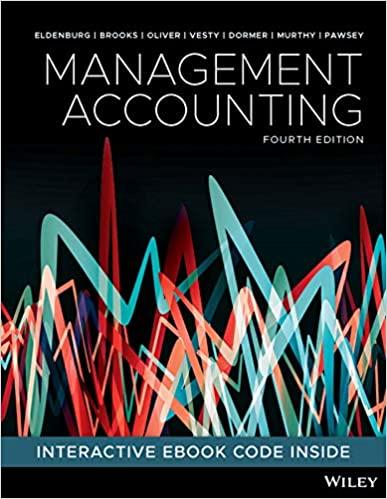Regal Foods is a multi-divisional company operating in a range of locations around the globe. Its product-based
Question:
Regal Foods is a multi-divisional company operating in a range of locations around the globe. Its product-based divisions are: Ice Cream and Associated Dairy Products, Confectionery, Nutrition, and Prepared Food. Regal has total sales in excess of $10 billion. The CEO, Ruby Day, recently undertook a company review which identified the following strategies and objectives:
• optimising product performance through strong research and development, product innovation and market share growth
• enhancing financial performance through financial discipline and targeted capital expenditure.
Divisional managers have traditionally been allowed significant autonomy in line with the decentralised divisional structure. CFO Paul Falkenberg has recently introduced relative performance evaluation (RPE) at the divisional level to promote competitiveness, with the objective of growing the company.
Ice Cream and Associated Dairy Products Division
The Ice Cream and Associated Dairy Products Division focuses on such products as ice cream, yoghurt, milk and cheeses. The current divisional manager is Alette Rennie, who has been in the position for the past three years. In that time, Alette has achieved average annual divisional revenue growth of 6 per cent. However, there are concerns about some of the exposures the division has.
For example, in a recent email to the CFO and CEO, Alette expressed concerns about some of the division’s exposures to the agricultural industry, the increasing global competition in dairy products, and the lack of bargaining power of the company in the local milk price wars.
Nutrition Division
The Nutrition Division focuses on health-related products. Historically, the Nutrition Division has been an excellent contributor to group performance, with annual growth rates of up to 12 percent for the period 2006 to 2012, and revenues exceeding $2 billion. However, divisional manager Bruce Buncle has found it increasingly difficult to maintain growth. An increasingly crowded market for health and nutritional products seems to be the main driver of these difficulties. As a consequence, debt levels of the division seem to be rising. However, Buncle is conscious that he needs to develop new products and markets in line with company objectives.
Buncle and his management team have been considering a range of investment opportunities and have decided on a major investment in the bottled water industry. While the industry has its challenges (for example, environmental opposition to the use of plastic bottles, tightening environmental regulations and the expectation of reduced carbon emissions), Buncle and his management team see a lot of potential with such a strategic move. However, where significant capital expenditure is required, Buncle finds the company investment decision-making processes frustrating.
The management team within the Nutrition Division has identified a new spring water source in a regional area. The local authorities are in favour of the springs being used to supply the Nutrition Division with spring water for a new water bottling plant to be built in the region. In fact, the local authorities are willing to forgo local taxes and provide subsidies to Regal to ensure the plant is built. The region has experienced relatively high levels of unemployment in recent years and the new plant will generate some 100 local new jobs. While there is some local opposition to the new facility on environmental grounds, Buncle considers these to be manageable. While he knows the project’s financial benefit is mainly after the third year, he knows that the investment is a good strategic move for his division.
Required
Using the risk classification framework (strategic, operational, legal and regulatory, and financial) identify the key risks to which Regal and its divisions are exposed.
Step by Step Answer:

Management Accounting
ISBN: 9780730369387
4th Edition
Authors: Leslie G. Eldenburg, Albie Brooks, Judy Oliver, Gillian Vesty, Rodney Dormer, Vijaya Murthy, Nick Pawsey





